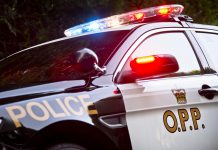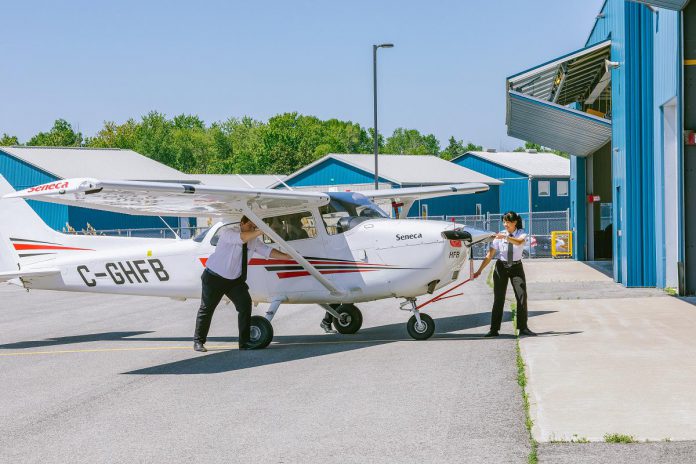
If you’re interested in pursuing a career in the fast-growing aerospace sector, you’ll be happy to know a national leader in aviation education is located right here in Peterborough & the Kawarthas.
Seneca Polytechnic (previously known as Seneca College) began offering programming for its School of Aviation — one of Canada’s top aviation schools — at the Peterborough Airport 10 years ago.
Housing Seneca’s fleet of aircraft and flight training devices, the Peterborough Campus is the home base for students studying in the four-year Honours Bachelor of Aviation Technology program. Students spend the first year of the program in the classroom at Seneca’s Newnham Campus in Toronto, before continuing their studies and flight training for the remaining three years in Peterborough.
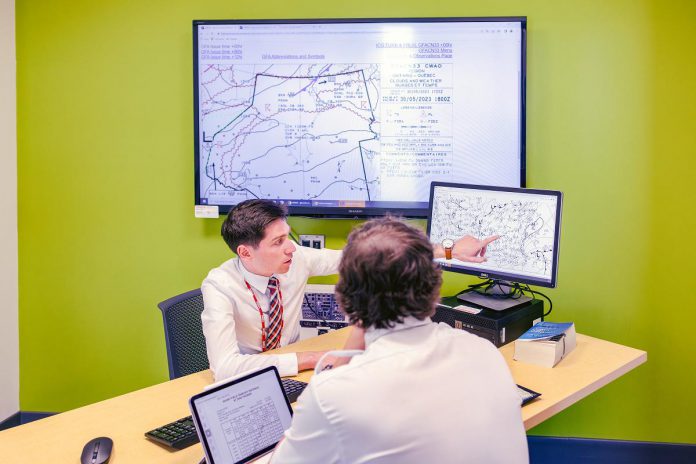
“In both the academic and flying components of the program, students learn from active and retired airline pilots who have significant industry experience,” says Nicky Eastwood, a professor at the School of Aviation. “Students complete in-aircraft flight training and log about 40 hours in each of our two Flight Training Devices to really get them career-ready for when they graduate.”
Seneca Polytechnic offers the only aviation technology-based degree program in Canada, which means students come to Peterborough from across the nation to study.
“Most other programs in postsecondary institutions have a very different setup and are more business-related, whereas this is a very technology-based program that really focuses on aviation,” says Eastwood.
VIDEO: Aviation at Seneca Polytechnic
Seneca’s decision to relocate its School of Aviation campus to Peterborough is yet another example of a successful partnership with the Peterborough Airport.
“The airport’s growth supports the establishment of training and educational programs in partnership with local institutions, creating workforce supply, and pathways for individuals to enter the aviation and aerospace industries,” says Kyle Bruce, Manager of Airport Administration at the Peterborough Airport. “These programs offer hands-on experience and apprenticeships, allowing employees to gain valuable skills and climb career ladders within their chosen fields.”
While Seneca’s Honours Bachelor of Aviation Technology program often sees graduates land a job as a commercial airline pilot, it can also lead to a range of other exciting careers in the aerospace sector.
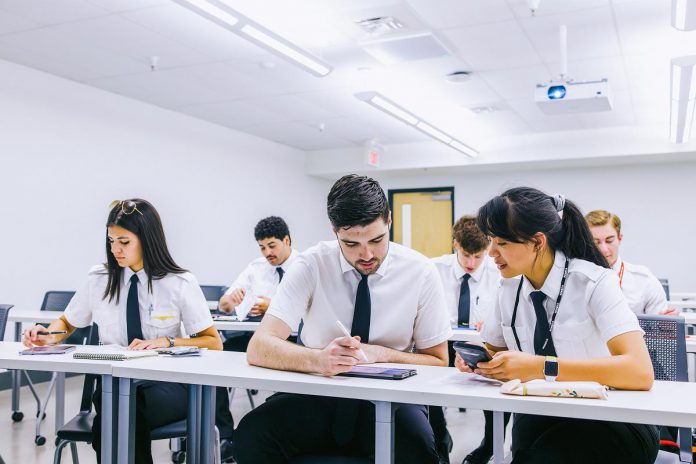
“We’ve had students go into air traffic control, military operations, management, and training departments to list a few,” Eastwood explains. “It opens doors for lots of areas. Sometimes students will be introduced to other career opportunities along the way.”
The four-year degree includes at least one work term between two semesters, when students get real-world experience in a variety of positions in aviation, whether in their hometown, across the country, or even around the world.
“There are a lot of opportunities out there to explore and it really depends on what the student wants and where they want to go — as long as it’s in the aviation industry,” says Eastwood. “It might open even more doors for that student down the road after they graduate.”
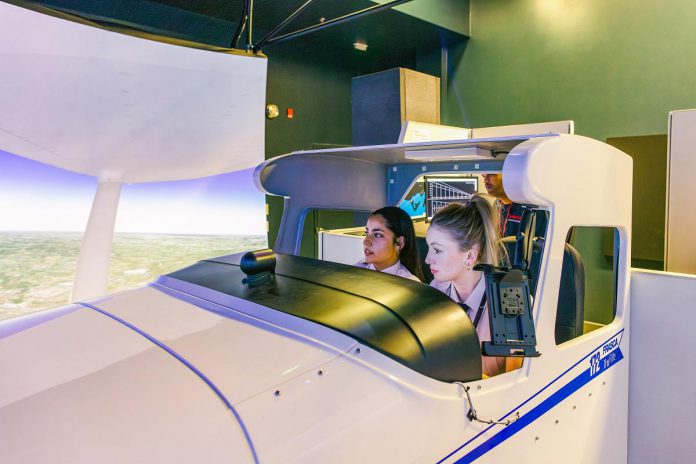
For those students who prefer to spend their work term in Peterborough, many of the 22 businesses located in the Peterborough Airport offer work placement opportunities, including Seneca itself.
“We do encourage students to stay in Peterborough because there is such a collection of careers here,” Eastwood says. “We even hire some of our students to work in the operations and maintenance departments, which is a great way for them to help with mentoring students who are just starting their flight training. The more positions we can offer in Peterborough, the more it helps the students, the airport, and Seneca. It’s good for everyone.”
As a preeminent hub for aviation and aerospace in Eastern Ontario, there is no better place than the Peterborough Airport for students to launch their aerospace careers.
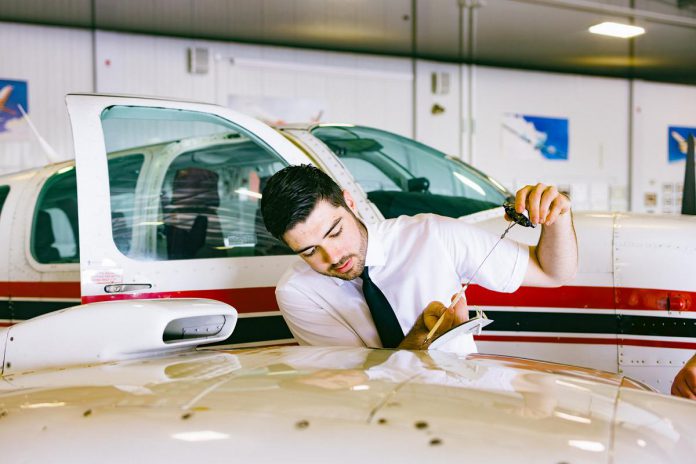
“As the airport expands its infrastructure and facilities, it attracts more aviation and aerospace businesses,” says Bruce. “This growth increases demand for services such as MRO (maintenance, repair and overhaul), aircraft support, and flight training, and creates opportunities to partner with local colleges and universities to address workforce supply challenges. The influx of businesses also boosts demand for skilled workers, leading to more job opportunities across various sectors.”
Seneca Polytechnic also welcomes high school students participating in the Aviation and Aerospace Specialist High Skills Major program, led by the Peterborough Northumberland Victoria and Clarington Catholic School Board.
Through an eight-week paid summer placement, the students gain valuable on-site experience working with businesses located at the airport, introducing them to and preparing them for a future in aviation.
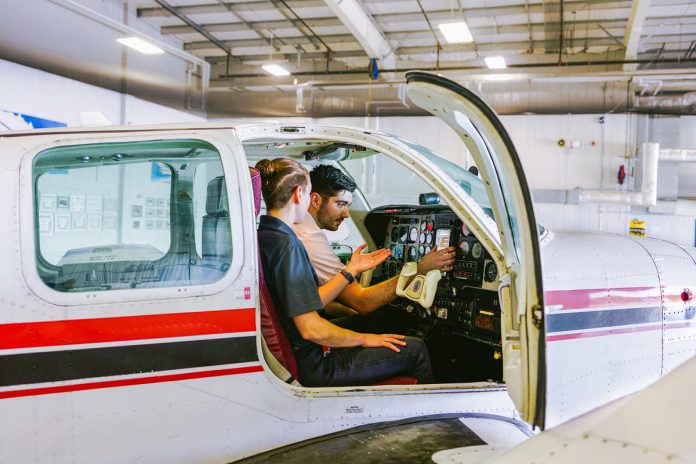
Seneca also encourages female high school and postsecondary students to explore careers in aviation through school visits and participation in industry events like the Oshawa Girls Take Flight Aviation and Aerospace Expo.
“Seneca Polytechnic has been heavily involved in encouraging women in aviation because it’s not something that’s explored enough and female employment is highly outnumbered by the men,” says Eastwood. “It’s nice to see a focus on the women in aviation side, because girls need to see it as a career path too.”
As the Peterborough Airport continues to grow, so too will the School of Aviation, providing even more opportunities to train future pilots and others working in the aerospace sector.
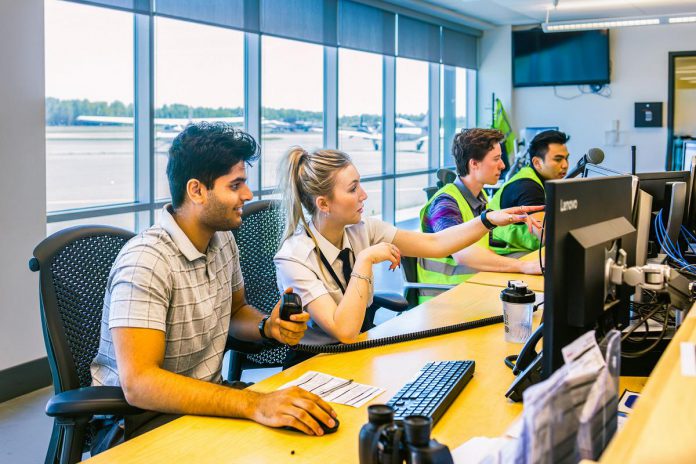
“Peterborough has been a perfect place for us,” Eastwood says. “We have amazing facilities, the staff and students are great, and the support of the Peterborough community has been incredible. It’s a program that hopefully will continue for many years.”
For more information about Seneca Polytechnic’s School of Aviation, visit senecapolytechnic.ca/aviation.html.
Explore more training and employment opportunities at the Peterborough Airport at peterborough.ca/en/doing-business/airport-services.aspx.
This branded editorial is one of a series created in partnership with Peterborough & the Kawarthas Economic Development. If your organization or business is interested in a branded editorial, contact us.






